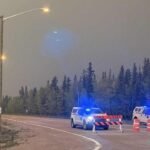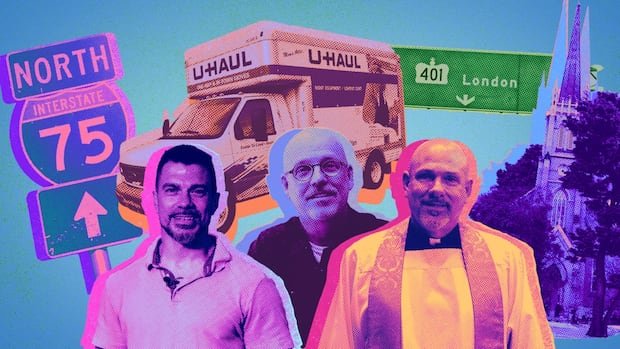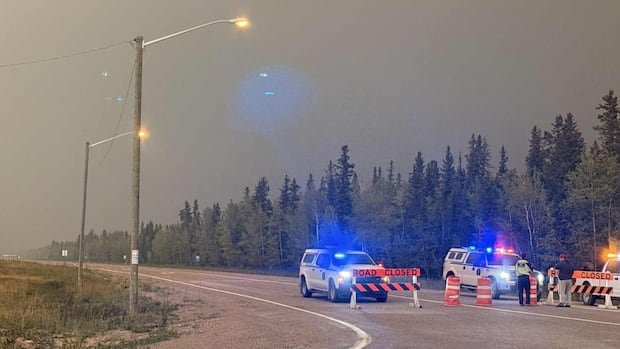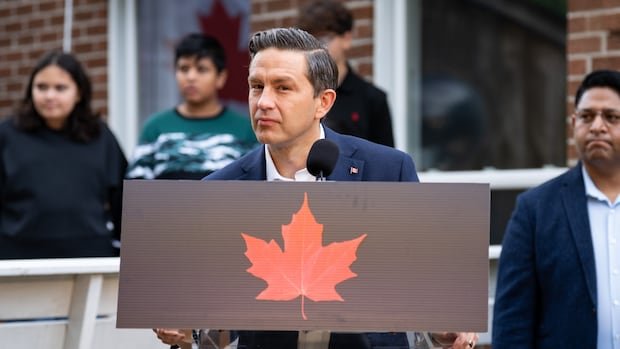Robert Apgar-Taylor vividly remembers the day he and her husband, Robert Taylor, crossed the border to Canada, fleeing the changing political climate in their native United States with the hope of a safer life in Canada.
“We took a photo on the border. It was winter,” said Apgar-Taylor. “We wear our shirts and checkered hats, and show our immigration papers with the moving truck behind us. We were very excited.”
To avoid confusion, this story refers to Apgar-Taylor’s husband as Rob.
The couple moved to Canada in December 2022.
Apgar-Taylor, a former reverend in the United Church of Christ, had just been designated for a parish of the United Church in Canada in London, Ontario.
“When Trump was first chosen [in 2016]We thought about going, but we thought we were exaggerating and things couldn’t get so bad, “he said.” But things turned out to be as bad as we imagined. “
Since Trump began their first term in 2017, the couple observed with anguish and felt increasingly uncomfortable with the changing political climate in their country.
First, there was the elimination of a page dedicated to the 2SLGBTQ+ community of the White House website, only a few hours after Trump’s inauguration in 2017.
In 2020, there was a violent repression of anti -racism protesters with rubber bullets and tear gas outside the president’s residence. The attack on the United States Capitol occurred a year later.
“I could not believe that the Constitution and the safeguards of civil society were being dismantled and that people followed blindly [Donald Trump]”Rob, a Washington police officer, DC, recalls at that time.
As an openly gay pastor, Apgar-Taylor said he received a death threat while working in Maryland.
But the final blow to the couple arrived in 2022, when the United States Supreme Court knocked Roe v. Wade, who guaranteed the right to abortion throughout the country.
“Fifteen seconds after listening to the news, Rob looked at me and said: ‘That’s enough. We have to leave,” Apgar-Taylor recalled.
Dozens of requests on resettlement
The two are not the only ones who have sought to move to Canada since Trump’s arrival to politics.
In the two weeks after Trump’s re -election in November, the couple received about 30 messages from Americans who asked how to establish themselves north of the border.
The United Church in Canada, on the other hand, reports that they have been contacted by about 20 members of the American clergy interested in obtaining positions in Canada since January. Previously, I received only three to five of these applications annually.

A few kilometers from the parish where Apgar-Taylor is now working, another American supervises the Sunday service: the reverend Joshua Lawrence in the first ST. Andrew’s United Church, also in London.
Texas’s civil rights activist moved to the southwest of the city of Ontario with his wife, Amaiee Collins, who is of African -American descent, and his little son four years ago. They made the movement to escape what the shepherd sees as an increase in racism and intolerance since the emergence of Trump’s popularized movement makes the United States again (Maga).
“There have been acts of violence,” Lawrence said. “The black churches have burned in the south. The problems of slavery, the emergence of the Ku Klux Klan … White terrorism. All these things have begun to resurface in other forms.”
The Reverend, who believed he was ministering in a progressive parish, quickly saw new tensions appear within his own congregation.
He said he received an email suggesting that his wife leaves the parish. Then, they showed the door because their values were considered too liberal.
He added that in his former parish, openly showing his support to the 2SLGBTQ+ community and the fight against racism, as he does now in Canada, he would have been risky.
“I often wondered if I could do it without risking the threats or the attacked church,” he lamented.
Because open transport of firearms in public places such as churches can be done legally in Texas, Lawrence worried about the potential for violence.
“We packed our things and went, maybe faster than necessary, but we were afraid and we didn’t know what could happen.”
Become Canadian not so simple
While Apgar-Taylor and Lawrence now enjoy their new Canadian refuge with their families, the challenge of obtaining permanent Canadian residence is far from finishing.
Both men have work visas linked to the United Church of Canada. They hoped to obtain a permanent residence after six months to two years in Canada, but the recent decrease in Ottawa of permanent immigration thresholds frustrated their plans.
For example, Apgar-Taylor and Rob have not yet been able to become housing owners because until they obtain a permanent residence, they will have to pay a foreign buyers tax of 25 percent in Ontario.
The situation forced Apgar-Taylor to postpone his prostate cancer surgery for three months, when the couple had to urgently move from their rented apartment.
“I couldn’t get surgery and move at the same time,” he said. “It was devastated.”
As for her husband, she had to give up her career in the application of the law and now works nights in a warehouse.
Lawrence and his wife are often forced to live very separate since the trained midwife and the ultrasound technician have not yet been able to obtain the qualifications to work in their field in Ontario.
He spends several weeks a month in the United States to make a living.
“There were times when we asked if we had made the right decision,” Lawrence said.
In a statement sent by email, immigration, refugees and citizenship of Canada declared that immigration processing times “depend on several factors, including immigration objectives, file complexity, security verifications and the punctuality of applicants who respond to information requests.”
‘The door is closed’

Immigration lawyer Greg Willoughby has heard similar stories of customers born in the United States facing barriers trying to emigrate to Canada.
From his small position in downtown London, he regularly receives calls from Americans, including parents of transgender children, who seek to escape the policies of US administration.
“When Trump was first chosen, I received calls from people who asked if there were specific immigration options for Americans, and the answer is ‘no’,” said Willoughby.
He pointed out that Americans must qualify through a point system established by OTTAWA to evaluate them as possible immigration candidates.
“If you are not a 20 or 30 -year -old young person with a degree from a Canadian university and some years of work experience in Canada, you will not be able to obtain enough points.”
He pointed out that a growing number of Americans is resorting to humanitarian and compassionate applications, although their chances of success are scarce.
“It is no longer the Vietnam War, and we no longer welcome the Draft Dodgers. It is the same for transgender people. The door is closed.”
‘An American recovery’

Despite the obstacles, Apgar-Taylor, Rob and Lawrence are still hopeful of their future in Canada.
“My name is Rob, and I am an American recovery,” is how Apgar-Taylor sometimes likes to open his sermons.
In the basement of his home, the reverend and his husband contemplate the photos of his children and grandchildren in a family tree painted on the wall.
“We miss them every day,” Robert said.
Both feel that returning to the United States is not an option for them.

The year in which Apgar-Taylor and Rob moved to London, two of his friends were assaulted back home in separate attacks due to their sexual and gender identities.
“You don’t realize how much you are containing your breathing until you no longer have to hold it. This is how it feels in Canada,” Apgar-Taylor said.








